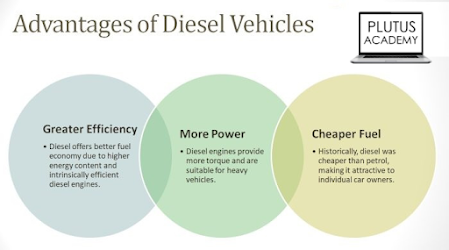Proposed Additional Tax on Diesel Vehicles
The published article is about the news of the proposed extra tax on Diesel vehicles by Road Transport Minister of India Shree Nitin Gadkari. Gaurav Nikumbh has written this article, which is an excellent Topic for current affairs on the Indian Economy. Well-qualified mentor Kapil Kushwah has approved the article to publish.
The Resistance
to Diesel in India
Governmental Green
Objectives:
The Indian
government aims to reduce greenhouse gas emissions and generate 40% of its
electricity to reach zero net emissions by 2070 from renewable sources.
Fiscal Strain:
Currently, the
federal government charges a 28% tax on diesel-powered automobiles and an extra
cess dependent on the engine size.
Emissions
Mystery
Concerns about the natural world are increased by the high amounts of nitrogen oxides (nox) produced by diesel engines. The 2015 Volkswagen crisis severely damaged diesel's reputation.
Students need to read daily current affairs to scale their general knowledge. They can get such current affairs updates on the Plutus Academy website.
The price difference between diesel and gasoline has decreased following gasoline liberalization in 2014, even though diesel-powered automobiles offer higher mileage and performance.
Costly Advancements:
Automobile manufacturers left the gasoline-powered market as a result of the implementation of BS-VI emission rules beginning on April 1, 2020, and the pricey improvements diesel engines needed to meet with these standards. They claimed that diesel versions were no longer financially feasible after moving from bs-iv to bs-vi.
Status of Diesel
Vehicles in India:
Diesel’s
Significant Share:
Diesel constitutes
approximately 40% of India’s petroleum product consumption, as per estimates
from the petroleum planning & analysis cell.
Transportation
dominance:
Around 87% of total
diesel sales serve the transport sector, with trucks and buses making up about
68% of diesel sales in India.
Three states,
namely Uttar Pradesh, Maharashtra, and Haryana, collectively account for nearly
40% of diesel sales in the country.
Impact on diesel
cars
Maruti Suzuki,
India’s largest car manufacturer, ceased production of diesel vehicles on April
1, 2020, and does not plan to re-enter this market.
Tata Motors,
Mahindra, and Honda no longer produce 1.2-litre diesel engines; they now offer
diesel options only for 1.5-litre or larger engines.
While some diesel
variants are still available from Hyundai, Kia, and Toyota, most automakers
have significantly reduced their diesel offerings since 2020.
This has led to a
decrease in the contribution of passenger vehicles to overall diesel demand,
dropping from 28.5% in 2013 to 16.5%.
Advantages Of Diesel Vehicles
Greater Efficiency:
Some individual
users prefer diesel due to better fuel economy. Diesel has higher energy
content per liter, and diesel engines are intrinsically efficient, utilizing
higher compression ratios and no spark plugs.
More power:
Diesel engines
offer more torque and are less prone to stalling, making them favoured for
heavy vehicles and haulage.
Cheaper Fuel:
Historically, lower
diesel prices than petrol were a significant attraction for individual car
owners, with a substantial price difference of up to Rs 25 per litre at its
peak.
Plutus Academy is a leading institute for the best bank coaching in Delhi. You can ace the bank exam with the superlative guidance of our highly veteran educators.




Comments
Post a Comment